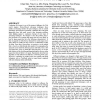Free Online Productivity Tools
i2Speak
i2Symbol
i2OCR
iTex2Img
iWeb2Print
iWeb2Shot
i2Type
iPdf2Split
iPdf2Merge
i2Bopomofo
i2Arabic
i2Style
i2Image
i2PDF
iLatex2Rtf
Sci2ools
159
click to vote
SIGIR
2012
ACM
2012
ACM
Fighting against web spam: a novel propagation method based on click-through data
Combating Web spam is one of the greatest challenges for Web search engines. State-of-the-art anti-spam techniques focus mainly on detecting varieties of spam strategies, such as content spamming and link-based spamming. Although these anti-spam approaches have had much success, they encounter problems when fighting against a continuous barrage of new types of spamming techniques. We attempt to solve the problem from a new perspective, by noticing that queries that are more likely to lead to spam pages/sites have the following characteristics: 1) they are popular or reflect heavy demands for search engine users and 2) there are usually few key resources or authoritative results for them. From these observations, we propose a novel method that is based on click-through data analysis by propagating the spamicity score iteratively between queries and URLs from a few seed pages/sites. Once we obtain the seed pages/sites, we use the link structure of the click-through bipartite graph to di...
Information Systems Applications | Information Technology | Label Propagation | SIGIR 2012 | Web Search Engines |
| Added | 28 Sep 2012 |
| Updated | 28 Sep 2012 |
| Type | Journal |
| Year | 2012 |
| Where | SIGIR |
| Authors | Chao Wei, Yiqun Liu, Min Zhang, Shaoping Ma, Liyun Ru, Kuo Zhang |
Comments (0)

